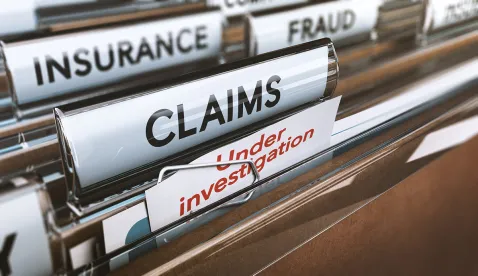Last week, the United Kingdom’s Supreme Court issued a landmark ruling (the “Judgment”) analyzing the extent to which business interruption coverage applies to losses caused by the 2019 novel coronavirus (COVID-19) pandemic and resulting government restrictions. In a ruling that bucked the trend of most American decisions on the topic, the U.K. Supreme Court found that some losses caused by COVID-19 and consequent local or national restrictions should be covered by business interruption coverage.
The FCA Ruling
The Judgment resulted from a “test case” brought by the U.K. Financial Conduct Authority (FCA), one of the entities regulating insurance in the U.K. The FCA asked the U.K. Supreme Court to issue a definitive interpretation of language commonly found in insurers’ business interruption policies (the “FCA Case”). The Judgment runs more than 100 pages; here, we aim to make it easier on you with a brief summary.
The business interruption policies involved in the FCA case were broadly similar to their American counterparts, insuring policyholders against “loss” caused by a business interruption. And like many U.S.-based policies, the FCA policies defined “loss” as “physical loss,” “physical damage” or “property damage.” Critically, however, the “physical loss” or “physical damage” language is not what the U.K. Supreme Court analyzed. Instead, it exclusively analyzed whether three so-called “extensions” provide coverage:
-
“Disease Clauses,” which offer coverage for business interruption losses caused by notifiable diseases at or within a specific proximity to the insured business;
-
"Loss of Access Clauses," which provide coverage for business interruption losses resulting from inability to access an insured premises caused by emergency actions taken by government or local authority;1
-
“Hybrid Clauses,” which contain both a Disease Clause and a Loss of Access Clause.
Beginning with the Disease Clauses, the U.K. Supreme Court found that an “occurrence” under the policies at issue was not the national COVID-19 outbreak, but instead each individual instance of COVID-19 occurring within the vicinity specified in the Disease Clause. Thus, so long as the claimant could identify a single instance of COVID-19 in the specified vicinity and a consequent interruption to business, there could be an “occurrence” under the business interruption provisions.
The U.K. Supreme Court then turned its attention to the Loss of Access Clauses, which resulted in two other pro-policyholder findings. First, the insurers argued that Loss of Access coverage only applied where the government action had the force of law, i.e. losses caused by governmental guidance and requirements related to COVID-19 that were not enforceable through state action were excluded. The Court rejected that argument, finding that coverage applied so long as from the “context of the instruction, compliance with it is required, and would be reasonably understood to be required, without the need for recourse to legal powers.”
The second “Loss of Access” issue was also a win for policyholders, but not an unconditional one. Here, the U.K. Supreme Court ruled that both an “inability to use” and “loss of access” must be total, i.e. not merely a hindrance or impairment. However, it also ruled that these requirements do not have to be judged against the entire business premises. Instead, coverage could be triggered where the “policyholder is unable to use the premises for a discrete part of its business activities or if it is unable to use a discrete part of its premises for its business activities.”
The Court then discussed a broadly applicable dispute regarding causation and damages. Under U.K. precedent (the Orient Express case) a claimant could not collect business interruption losses resulting from property damage where the loss would have been incurred anyway due to widespread devastation to the area surrounding the insured premises. Orient Express involved a small business in New Orleans (whose insurance specified English law) that claimed business interruption losses after Hurricane Katrina. In essence, the U.K. Supreme Court held that even if there was no property damage to her business, the claimant would have sustained the same losses because there was no one around to visit her business. The insurers in the FCA Case argued that the same principle should apply to the losses resulting from business interruptions caused by COVID-19 and the resulting mandates. The Court flatly stated that Orient Express was wrongly decided, overturned it, and rejected the insurers’ arguments.
Finally, it should be emphasized that the FCA Case was a “test case,” akin, in American parlance, to a legally binding advisory opinion. The Court went to great lengths to explain its generalized ruling was still subject to specific policy language, exclusions, and evidentiary burdens.
Status of US Courts on the Issue
Before turning to the potential impact of the FCA Case on U.S. business interruption coverage litigation, we should briefly recap where things stand. Litigation on whether COVID-19 and its resulting restrictions trigger coverage under business interruption provisions began almost immediately after the pandemic itself arrived. Almost universally in the U.S., these cases have involved analyzing whether the insured’s loss of use of their business premises caused by COVID-19 and resulting governmental restrictions constitutes a “physical loss” or “physical damage” to the insured property. The majority of American courts to rule on the issue have found that it does not, and that business interruption provisions consequently do not provide coverage.2
Increasingly, however, courts around the U.S. appear willing to find coverage for a variety of reasons. See, e.g., Elegant Massage, LLC v. State Farm Mut. Auto. Ins. Co., No. 2:20-CV-265, 2020 WL 7249624 (E.D. Va. Dec. 9, 2020); Studio 417 v. Cincinnati Ins. Co., No. 20-CV-03127-SRB, 2020 WL 4692385 (W.D. Mo. Aug 12, 2020); North State Deli, LLC v. Cincinnati Ins. Co., No. 20-CVS-02569, 2020 WL 6281507 (N.C. Super. Ct. Oct. 9, 2020). The point here is not to provide a comprehensive overview of case law; rather, it is to emphasize that whereas a finding of “no coverage” under business interruption provisions initially appeared to be a foregone conclusion in every court, that supposition may have been premature.
Takeaways for US Insurers
Limits of the decision
Before predicting what the U.K. Supreme Court’s decision could mean for U.S. litigation, it is important to once again highlight several crucial differences that will likely limit its influence on this side of the Atlantic.
First, and most importantly, the U.K. Supreme Court specifically carved out, and did not address, the “physical loss” or “physical damage” definition of “loss” in its ruling on the FCA Case. U.S. litigation has focused almost exclusively on that very language.3 Accordingly, this case is immediately distinguishable and its impact on U.S. litigation will be most significant where the policy either contains similar “extensions” to those analyzed in the FCA Case or defines “loss” similarly as an initial matter.
Second, unlike in U.S. litigation the FCA case did not involve the applicability of individualized policy language to fact. Instead, it was a “test case” in which the U.K. Supreme Court announced broadly applicable general principles based on policy language commonly found in policies providing business interruption coverage. In short, additional litigation will undoubtedly further clarify this holding as applied to individual policies and factual scenarios.
Third, although the U.K. Supreme Court was interpreting business interruption provisions that provided coverage similar to that found in U.S. policies, it focused largely on issues different from those which have been contested in U.S. litigation. As explained above, U.S. litigation has focused almost entirely on whether COVID-19 or the resulting shutdown constitute a “physical loss” to the insured property. Although the FCA test case does focus on potentially translatable issues related to “loss” (particularly those involving Loss of Access Clauses), its primary focus is on different “loss” definitions, as well as on causation—were particular interruptions caused by individual or local cases of COVID-19, or the national outbreak? And, under case law unique to the U.K. (i.e., Orient Express), does business interruption insurance provide coverage when the loss is caused by both?
Impact of the decision
Despite the differences, the FCA Case could have some impact on related U.S. coverage litigation.
As an initial matter, the Judgment may cause insurers to question whether the steady stream of victories on this topic will continue. From the outset of the outbreak, insurance companies have been confident that their business interruption policies do not provide coverage because the business closings caused by COVID-19 and resulting restrictions were not a “physical loss” of or “physical damage” to the property. This confidence was justified in the wake of numerous rulings affirming just that, and, as a general matter, is still warranted. However, even before the FCA ruling, courts across the U.S. had begun sporadically ruling against insurers on this issue. The Judgment is now added to an increasing list of cases that policyholders may cite to argue the “majority position” is wrong.
Relatedly, the FCA ruling may make it more difficult for insurers to avoid litigation to begin with. Just a few months ago, insurers could cite to near-unanimous authority when denying a policyholder’s tender under a business interruption provision for losses caused by COVID-19 and its economic consequences. However, would-be claimants and their attorneys now have at least some judicial support for their positions. Thus, claimants and their attorneys may be less likely to shy away from litigation in the first place.
Finally, the Judgment involved one particularly interesting issue that has thus far been largely absent from U.S. litigation: calculation of damages. In the FCA case, the insurers argued that the damages caused by the business interruptions that they covered should be reduced by the amount determined to also be caused by COVID-19 and the consequent shutdowns. In other words, the insurers argued that it makes no difference if the policyholder’s business was closed if people would not frequent it out of fear of the virus, or could not frequent it because of shelter-at-home orders or other government restrictions. The U.K. Supreme Court rejected the insurers’ arguments and found that the value of the claim should not be reduced when the downturn of business was the result of the same source as the insured peril. This undoubtedly will be a hotly contested issue in U.S. litigation as cases progress beyond the pleading stage. Stay tuned for further developments on that front.
1 Loss of Access coverage is somewhat akin to “Civil Authority” coverage contained in U.S. policies. Whether Civil Authority provisions provide coverage for COVID-19 and its resulting restrictions has been a component of some U.S. coverage litigation.
2 See, e.g., El Novillo Rest. v. Certain Underwriters at Lloyd's, London, No. 1:20-CV-21525-UU, 2020 WL 7251362, at *6 (S.D. Fla. Dec. 7, 2020); Promotional Headwear Int’l v. Cincinnati Ins. Co., No. 20-CV-2211-JAR-GEB, 2020 WL 7078735, at *7-9 (D. Kan. Dec. 3, 2020); 4431, Inc. v. Cincinnati Ins. Co., No. 5:20-CV-04396, 2020 WL 7075318, at *12-13 (E.D. Pa. Dec. 3, 2020); T & E Chicago LLC v. Cincinnati Ins. Co., No. 20 C 4001, 2020 WL 6801845, at *4-5 (N.D. Ill. Nov. 19, 2020); Brian Handel D.M.D., P.C. v. Allstate Ins. Co., No. CV 20-3198, 2020 WL 6545893, at *3 (E.D. Pa. Nov. 6, 2020); Uncork & Create LLC v. Cincinnati Ins. Co., No. 2:20-CV-00401, 2020 WL 6436948, at *5 (S.D.W. Va. Nov. 2, 2020); Hillcrest Optical, Inc. v. Cont'l Cas. Co., No. 1:20-CV-275-JB-B, 2020 WL 6163142 (S.D. Ala. Oct. 21, 2020); Harvest Moon Distributors, LLC v. S. Owners Ins. Co., No. 620CV1026ORL40DCI, 2020 WL 6018918, at *6 (M.D. Fla. Oct. 9, 2020); Turek Enters., Inc. v. State Farm Mut. Auto. Ins. Co., No. 20-11655, 2020 WL 5258484, at *6-8 (E.D. Mich. Sept. 3, 2020); Malaube, LLC v. Greenwich Ins. Co., No. 20-22615, 2020 WL 5051581, at *4-8 (S.D. Fla. Aug. 26, 2020); Rose’s 1, LLC v. Erie Ins. Exch., 2020 CA 002424 B, 2020 WL 4589206, at *5 (D.C. Super. Ct. Aug. 6, 2020).
3 See cases cited supra n.2.



 />i
/>i

